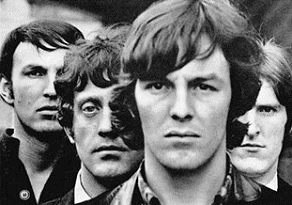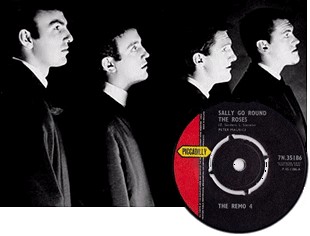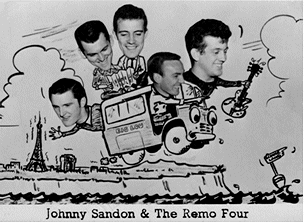Sixties
City presents
a wide-ranging series of
articles on all aspects of the Sixties, penned by the creator of the iconic
60s music paper Mersey
Beat
|
Sixties
City presents
a wide-ranging series of
articles on all aspects of the Sixties, penned by the creator of the iconic
60s music paper Mersey
Beat
|
|||||
|
 |
A
Mersey group who first formed as a vocal outfit, the Remo Quartet, in
1958 and played at social clubs and weddings. They changed to rock‘n’roll
music at the beginning of 1960 and were nicknamed ‘Liverpool’s Fendermen’
because they were the first group on Merseyside to have a complete line-up
of Fender guitars.
They appeared
on a number of Cavern bills with The Beatles, changing their name to 'The
Remo Four' when they appeared with The Beatles on Saturday 5th August
1960. Paul
McCartney used to say that on his nights off he’d visit the Cavern specially
to see The Remo Four.
The group comprised Keith Stokes (rhythm/vocals), Colin Manley, who was rated as Liverpool’s top rock‘n’roll guitarist and was the first to play a Fender (lead), Don Andrews (bass) and Harry Prytherch (drums). In December 1962 they became Johnny Sandon & The Remo Four in order to embark on a tour of US bases in France, when Roy Dyke replaced Prytherch and Johnny Sandon joined them. They made several further appearances on Beatles Cavern bills under the name Johnny Sandon & The Remo Four. The group performed some original numbers, including an instrumental ‘The Rat Race’ and a number sung by Sandon, ‘Spanish Main’. Their single ‘Yes’, flipside ‘Magic Potion’, was issued by Pye Records on 27th August 1963, but Johnny left on 18th December, after two years, to go solo. The Remo Four turned down the offer of becoming Billy J. Kramer’s backing band but seemed fated to be cast in the role of a support group and accepted the offer of backing Tommy Quickly. The group thought that they were on the brink of success when they teamed up with Quickly. They were now managed by Brian Epstein and were included on the Beatles Christmas show at the Finsbury Park Astoria and also joined The Beatles on their autumn tour of Britain in 1964. They were excited when The Beatles provided them with ‘No Reply’ to record and felt that it would be the single to take them and Tommy to the top of the charts. The Remo Four recorded the backing track, then double-tracked the guitars and added extra percussion, with Paul McCartney joining them on tambourine and John Lennon clinking Coke bottles in the background. Unfortunately, Quickly was slightly drunk and very nervous at the session and the single was never released. |
 |
The group then began to back a variety of singers including Georgie Fame,
Billy Fury and Billy
J. Kramer (when they called themselves the New Dakotas). By this time
Tony Ashton had joined the group. The personnel of the band comprised Manley,
Ashton, Dyke and Phil Rogers in 1968, when George Harrison used them on
the recording of the ‘Wonderwall’ album. A number they recorded during the
‘Wonderwall’ sessions was ‘In the First Place’ and it was finally issued
as a CD single in 1999. Bass guitarist Kim Gardner (who had appeared with The Birds, Ronnie Woods' first band 63-66)) teamed up with Roy Dyke and Tony Ashton in the trio 'Ashton, Gardner & Dyke' and they were later to have a chart hit in 1971 with ‘Resurrection Shuffle’. George Harrison was to play guitar on the ‘I’m Your Spiritual Breadman’ track on their album, ‘The Worst Of Ashton, Gardner & Dyke’. When the group broke up, Colin began to back singers such as Engelbert Humperdinck, Clodagh Rodgers and Freddie Starr, before becoming a member of the Swinging Blue Jeans. He died of cancer in April 1999. Johnny Sandon hung himself at Christmas 1997. Roy Dyke joined Badger while Tony Ashton joined Paice, Ashton and Lord. Tony died of cancer on 28th May 2001 and Kim Gardner died of cancer in Los Angeles on 24th October 2001. Harry Prytherch, who left the band to get married and settle down to a regular job and was replaced by Roy Dyke, then played with another local band Group One. Harry has lectured on the Mersey Sound for a number of years and has one of the largest collections of Mersey Sound memorabilia. Don Andrews and Keith Stokes still reside on Merseyside and Don was one of the founders of Merseycats, original exponents of the Mersey Sound who perform regularly for local charities. |
 |
|
Article
Text
UK
web hosting by
|